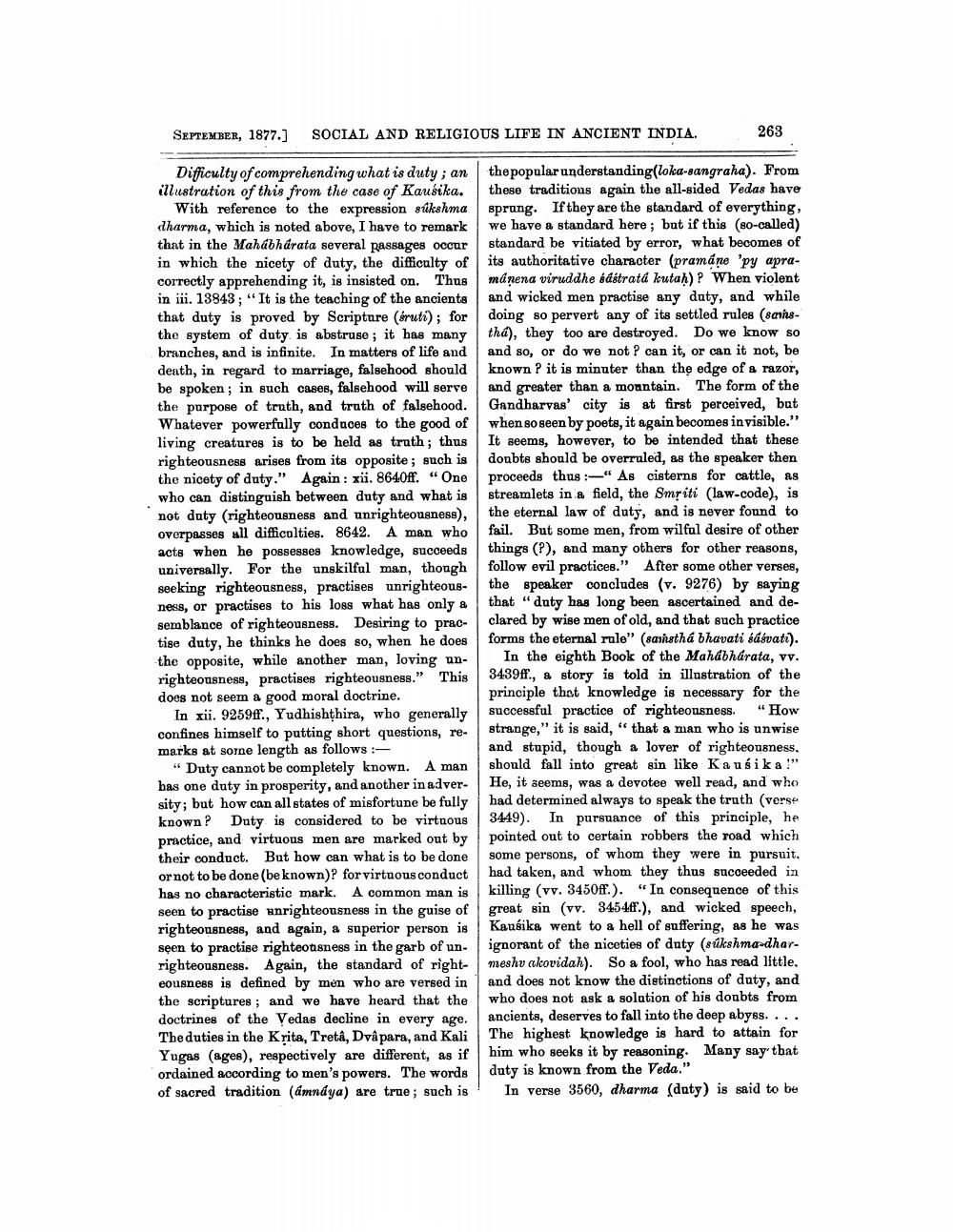________________
SEPTEMBER, 1877.] SOCIAL AND RELIGIOUS LIFE IN ANCIENT INDIA.
Difficulty of comprehending what is duty; an illustration of this from the case of Kausika.
With reference to the expression sûkshma dharma, which is noted above, I have to remark that in the Mahabharata several passages occur in which the nicety of duty, the difficulty of correctly apprehending it, is insisted on. Thus in iii. 13843; "It is the teaching of the ancients that duty is proved by Scripture (éruti); for the system of duty is abstruse; it has many branches, and is infinite. In matters of life and death, in regard to marriage, falsehood should be spoken; in such cases, falsehood will serve the purpose of truth, and truth of falsehood. Whatever powerfully conduces to the good of living creatures is to be held as truth; thus righteousness arises from its opposite; such is the nicety of duty." Again: xii. 8640ff. "One who can distinguish between duty and what is not duty (righteousness and unrighteousness), overpasses all difficulties. 8642. A man who acts when he possesses knowledge, succeeds universally. For the unskilful man, though seeking righteousness, practises unrighteousness, or practises to his loss what has only a semblance of righteousness. Desiring to practise duty, he thinks he does so, when he does the opposite, while another man, loving unrighteousness, practises righteousness." This does not seem a good moral doctrine.
In xii. 9259ff., Yudhishṭhira, who generally confines himself to putting short questions, remarks at sorne length as follows:
"Duty cannot be completely known. A man has one duty in prosperity, and another in adversity; but how can all states of misfortune be fully known? Duty is considered to be virtuous practice, and virtuous men are marked out by their conduct. But how can what is to be done or not to be done (be known)? for virtuous conduct has no characteristic mark. A common man is seen to practise unrighteousness in the guise of righteousness, and again, a superior person is seen to practise righteousness in the garb of unrighteousness. Again, the standard of righteousness is defined by men who are versed in the scriptures; and we have heard that the doctrines of the Vedas decline in every age. The duties in the Krita, Tretâ, Dvâ para, and Kali Yugas (ages), respectively are different, as if ordained according to men's powers. The words of sacred tradition (ámnáya) are true; such is
263
the popular understanding(loka-sangraha). From these traditions again the all-sided Vedas have sprung. If they are the standard of everything, we have a standard here; but if this (so-called) standard be vitiated by error, what becomes of its authoritative character (pramane 'py apramánena viruddhe śástratá kutah)? When violent and wicked men practise any duty, and while doing so pervert any of its settled rules (sanstha), they too are destroyed. Do we know so and so, or do we not? can it, or can it not, be known? it is minuter than the edge of a razor, and greater than a mountain. The form of the Gandharvas' city is at first perceived, but when so seen by poets, it again becomes invisible." It seems, however, to be intended that these doubts should be overruled, as the speaker then proceeds thus:-"As cisterns for cattle, as streamlets in a field, the Smriti (law-code), is the eternal law of duty, and is never found to fail. But some men, from wilful desire of other things (?), and many others for other reasons, follow evil practices." After some other verses, the speaker concludes (v. 9276) by saying that "duty has long been ascertained and declared by wise men of old, and that such practice forms the eternal rule" (samstha bhavati sáśvati).
In the eighth Book of the Mahabharata, vv. 3439ff., a story is told in illustration of the principle that knowledge is necessary for the successful practice of righteousness. "How strange," it is said, "that a man who is unwise and stupid, though a lover of righteousness. should fall into great sin like Kausika!" He, it seems, was a devotee well read, and who had determined always to speak the truth (verse 3449). In pursuance of this principle, he pointed out to certain robbers the road which some persons, of whom they were in pursuit. had taken, and whom they thus succeeded in killing (vv. 3450ff.). "In consequence of this great sin (vv. 3454ff.), and wicked speech, Kausika went to a hell of suffering, as he was ignorant of the niceties of duty (súkshma-dharmeshv akovidah). So a fool, who has read little. and does not know the distinctions of duty, and who does not ask a solution of his doubts from ancients, deserves to fall into the deep abyss. . . . The highest knowledge is hard to attain for him who seeks it by reasoning. Many say that duty is known from the Veda."
In verse 3560, dharma (duty) is said to be




